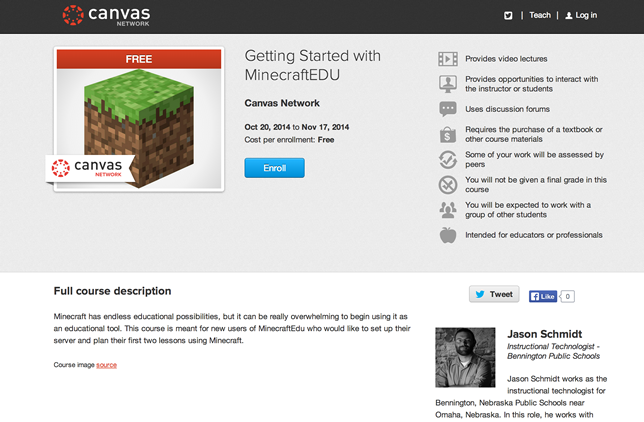Teaching with Minecraft? MOOC Explores Gamification for K-12
Instructure has launched a series of massive open online courses (MOOCs) for K-12 teachers, students and parents, including two that use Minecraft to help teachers implement gamification best practices in the classroom.
The first Minecraft MOOC, Getting Started with MinecraftEDU, is designed to introduce teachers to using the game as an educational tool and provides help on planning the first two lessons with the game. The course will run October 20-November 17.

"Even young kids have gotten very adept at Minecraft, so it can be quite intimidating for teachers," said Jason Schmidt, an instructional technologist for Bennington Public Schools who will teach the four-week MinecraftEdu MOOC, in a prepared statement. "If I can help get teachers over that hump, imagine how delighted students will be to have a learning environment tailored to their interests for a change."
The other, Minecraft for Educators, "is a course for teachers who are wishing to gamify their learning experiences and deliver a unique pedagogy that will engage, enthuse and keep learners coming back for more," according to information released by the company. Both MOOCs are available through the Canvas Network. Minecraft for Educators will start January 26, 2015 and run through March 9.
The company has also released a Minecraft app to allow students to submit assignments to the Canvas learning management system from within the game. Using the app, students can tag what they've made in the game for their teachers to visit, upload books they've written in game directly to the speed grader or use the game's circuitry tool to complete assignments that will be automatically graded. A video demonstration of the app is available at YouTube.
Other MOOCs for teachers in the suite include:
Among the other MOOC offerings in the new suite is a course designed specifically for parents, Parenting in the Digital Age, which aims to help them address issues such as cyberbullying, digital citizenship, exposure to inappropriate content, media literacy and screentime. Taught by Andrew Swickheimer, director of technology at Noblesville Schools, the self-paced course opens September 22.
"Parental involvement in K-12 education has one of the biggest impacts on a child's commitment to learning," said Jared Stein, vice president of Research and Education at Instructure, in a prepared statement. "We're launching the industry's first-ever MOOC for parents to help them understand education in a digital world."
New MOOCs for students on the Canvas Network include:
"MOOCs have the power to tear down walls and bring our brightest contemporaries together," said Melissa Loble, senior director of Canvas Network at Instructure, in a prepared statement. "Through Minecraft and other engaging forums, we want to help teachers and students come together to advance education everywhere."
More information about MOOCs available through the Canvas Network is available at canvas.net.
About the Author
Joshua Bolkan is contributing editor for Campus Technology, THE Journal and STEAM Universe. He can be reached at [email protected].